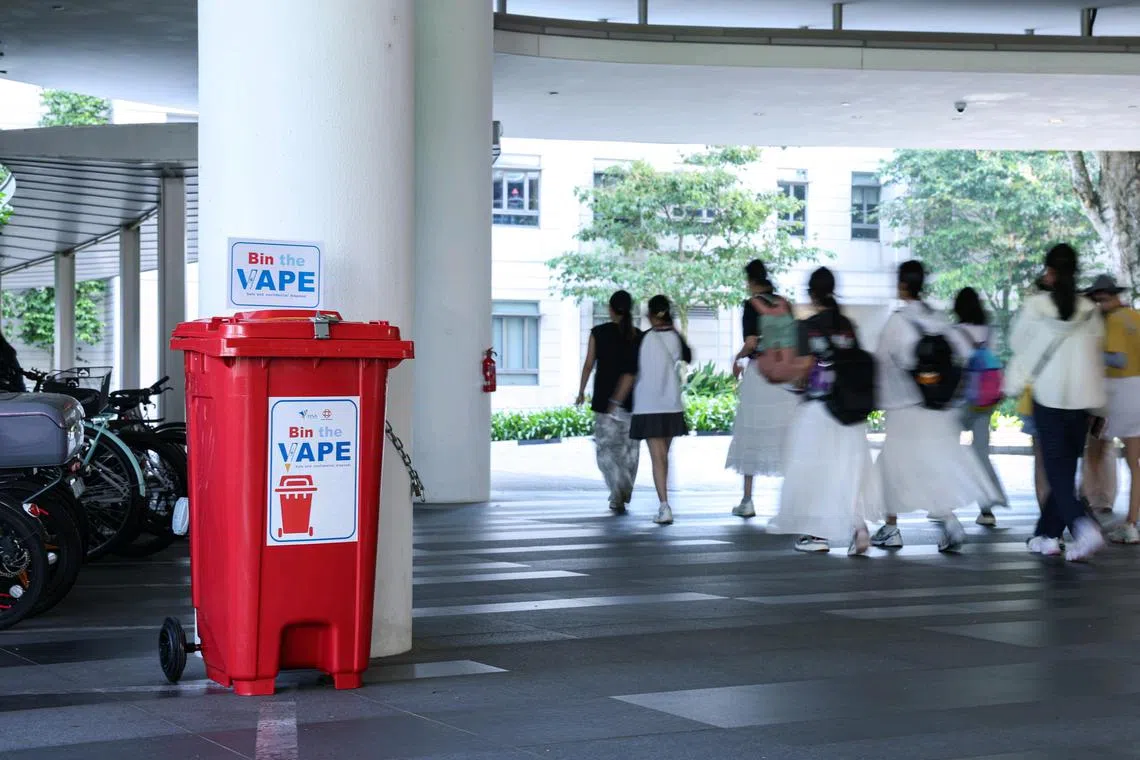Vape bins placed in Singapore’s six autonomous universities to encourage voluntary disposal
Sign up now: Get tips on how to help your child succeed

Each university has placed one bin on campus and is assessing the need for more.
ST PHOTO: BRIAN TEO
- Vape bins are being placed in universities as part of the "Bin the Vape" campaign by HSA and PA to encourage voluntary surrender without penalty.
- Vaping is rising among students, with 2,000 cases reported in 2024. Universities take a firm stance, with disciplinary actions for those caught.
- MOH is classifying etomidate as a Class C controlled drug; an amnesty period allows users to surrender devices without penalties before the new law kicks in.
AI generated
SINGAPORE – Vape disposal bins have been placed at Singapore’s six autonomous universities as part of a national push to tackle the rising trend of vaping among youth.
The bins are part of the Health Sciences Authority (HSA) and People’s Association’s “Bin The Vape” campaign
Possessing, using or buying vapes carries a maximum fine of $2,000, but the authorities said no action will be taken against those who voluntarily dispose of their vapes.
These bins have been placed at 23 community clubs and one residents’ network centre around the island, including in Punggol, Boon Lay, Mountbatten, Woodlands and Bishan.
The move aims to foster a supportive, stigma-free environment for those trying to quit vaping, said the Singapore Institute of Technology.
Each university has placed one bin on campus and is assessing the need for more. The move was announced in a circular sent to students and staff last week.
Under the law, it is an offence to possess, purchase or use e-vaporisers or related products.
Vaping is on the rise among students, including those in institutes of higher learning, with 2,000 cases reported in 2024
In response to queries from The Straits Times, all six universities said they take a firm stance against vaping. Students caught will face disciplinary action and may be reported to the authorities. But those who voluntarily surrender their devices or seek help to quit will not be penalised.
The institutions also said they are stepping up education and enforcement efforts to maintain a vape-free campus.
The National University of Singapore (NUS) and Nanyang Technological University (NTU) said offenders living on campus may be suspended and barred from such housing.
NTU added that vaping on campus, regardless of e-vaporiser content, will constitute a breach of its code of conduct. During orientation programmes, freshmen will be reminded of the illegality and dangers of vaping and the university’s strict stance against it. Its halls of residence will also issue circulars on NTU’s policy.
Those caught vaping on campus, regardless of vape content, may face disciplinary action such as fines or being barred from staying in NTU’s halls of residences, or be required to go for counselling. They must also attend a vaping cessation programme conducted by the Health Promotion Board.
The Singapore University of Social Sciences (SUSS) said it jointly enforces a strict no-vaping policy with the Singapore Institute of Management on their shared campus. It has put up “no vaping” banners and conducts regular security patrols. It uses CCTV surveillance to deter and detect violations.
SUSS added that students found vaping on campus will have their devices confiscated, their personal details recorded, and be reported to HSA.
Meanwhile, NUS said those who witness vaping activities on campus can make a report through its whistle-blowing channel.
The Singapore Management University (SMU) said it maintains a general whistle-blowing policy, which allows individuals to report in good faith any improper activities, including those that affect safety or well-being.
“We recognise that students may turn to vaping for various reasons – such as stress, peer influence or curiosity – and encourage those who wish to stop vaping to seek confidential support through our wellness centre or the Health Promotion Board’s QuitLine on 1800-438-2000,” said SMU.
The Singapore University of Technology and Design said its campus is smoke-free and it has strict rules to maintain a safe and healthy environment.
All incoming freshmen attend an orientation session on residential life that includes a segment on the risks and consequences of drugs and vaping.
The Ministry of Health (MOH) is in the process of classifying etomidate, a sedative increasingly found in vapes, as a Class C controlled drug
Once the law kicks in, those caught using etomidate-laced vapes will face mandatory supervision and rehabilitation.
Under current laws, those caught selling, importing or distributing such vapes could face jail and caning.
Correction note: In an earlier version of the story, we said the vaping cessation programme is conducted by the Health Sciences Authority. This is incorrect. It is conducted by the Health Promotion Board.
Additional reporting by Elisha Tushara




